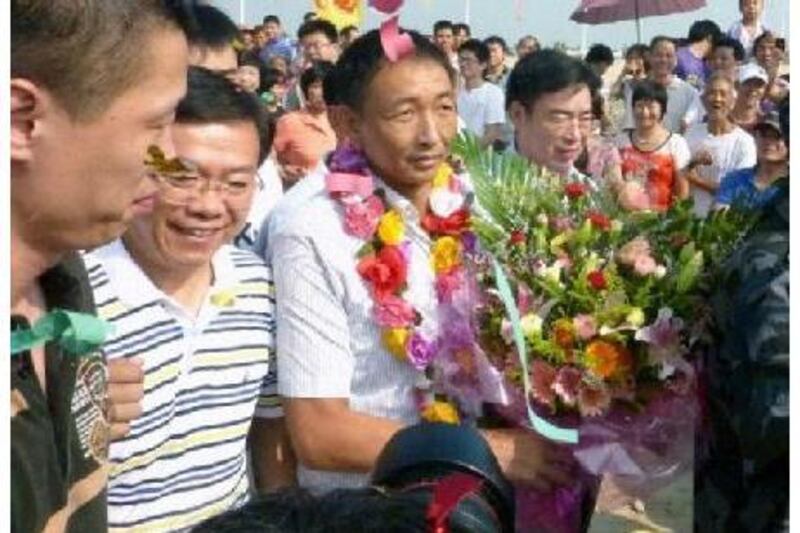BEIJING // The tensions between Japan and China persisted yesterday as Tokyo called for the release of four of its citizens arrested by China for the alleged filming of military facilities. The Japanese foreign minister, Seiji Maehara, indicated the four must be released if relations are to improve.
The diplomatic hostilities had appeared to be easing. Japan on Friday released a Chinese trawler captain arrested more than two weeks earlier after his vessel struck two Japanese coastguard ships near disputed islands in the South China Sea. But Japan rejected China's demand for an apology over the captain's detention and then demanded that China pay for the damage to the coastguard vessels. The four Japanese men, arrested before the trawler captain's release, were detained for supposedly filming in a Chinese military area. They are being held at a hotel in the city of Shijiazhuang, south-west of Beijing, it has been reported.
In an interview with international media yesterday, Mr Maehara said Japan wanted the disagreement over the men's detention "to be quickly and peacefully resolved". He described their release as "the first step" to rebuilding damaged ties. "It was regrettable as China's response was escalated to the extreme," he said. "The people of the world have seen an aspect of China's true nature." In a sign it might be keen for tensions to thaw, China is said to have lifted a ban on the export of rare earth metals to Japan.
China controls the export of 97 per cent of the world's supply of such metals, used to makes products such as wind turbines and electric car batteries. Japan, which said it was looking for alternative suppliers, accounts for half of worldwide consumption. Ding Xueliang, a professor at Hong Kong University of Science and Technology who specialises in China's foreign relations, said China had recently become "more and more aggressive, more and more assertive".
The Chinese government did "not care so much about one or two Chinese individuals arrested by a foreign country", but had acted robustly because the waters where the trawler captain was arrested hold gas reserves, he said. Both China and Japan need energy desperately, he said. "Perhaps [Japan] feels it's time to react to Beijing's assertive, stronger foreign policy with even stronger reactions," he said.
"That's the dynamic … perhaps they've calculated it's better to send out a strong message sooner rather than later." The trawler captain was arrested on September 8, the day after his vessel collided with the Japanese vessels near the islands known as Senkaku in Japan and Diaoyu in China, and claimed by both governments as well as by Taiwan. As irritation between the countries grew last week, Wen Jiabao, the Chinese premier, refused to meet his Japanese counterpart, Naoto Kan, at the United Nations. Earlier, China warned Japan that it would "bear all the consequences" if the trawlerman was not released.
Other high-level ministerial contacts between the two were suspended and invitations for about 1,000 Japanese schoolchildren to visit Expo 2010 in Shanghai cancelled. The spat is the worst between China and Japan since Junichiro Koizumi, the Japanese prime minister between 2001 and 2006, made visits while in office to the Yasukuni shrine, a memorial in Japan where those honoured include Japanese war criminals.
Many Chinese still resent Japan's actions during the Second World War when it occupied parts of China. No Japanese prime minister since Mr Koizumi has visited the shrine, and relations had warmed.
* With additional reporting by Associated Press







